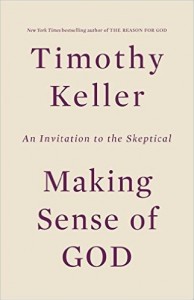 Thus far Tim Keller’s book Making Sense of God : An Invitation to the Skeptical has looked at six aspects of human life, givens that Keller suggests we cannot live without: meaning, satisfaction, freedom, identity, hope, and justice. Each chapter looked at both secular and Christian narratives, and at the specific focus that Christianity offers. In the last two chapters he turns to a broader overview. He begins by asking “is it reasonable to believe in God?” and offers six specific reasons the answer is yes. Before digging into the list, however, it is important to set the stage. God (if there is a god) is not a creature or object contained within the material universe. “[Religions] understand God rather as Being itself, the ground and condition for all other things to exist. All things that have being depend on God moment by moment for it. Without God nothing would exist at all.” (p. 217) This has important consequences for the way we should look for evidence of God. Keller quotes C. Stephen Evans “To believe in God is to believe the universe has a certain character; to disbelieve in God is to believe the universe lacks that character and has a very different character.” (Why Christian Faith Still Makes Sense, p. 22) Arguments for the existence of God are best shaped by the nature of the world we experience.
Thus far Tim Keller’s book Making Sense of God : An Invitation to the Skeptical has looked at six aspects of human life, givens that Keller suggests we cannot live without: meaning, satisfaction, freedom, identity, hope, and justice. Each chapter looked at both secular and Christian narratives, and at the specific focus that Christianity offers. In the last two chapters he turns to a broader overview. He begins by asking “is it reasonable to believe in God?” and offers six specific reasons the answer is yes. Before digging into the list, however, it is important to set the stage. God (if there is a god) is not a creature or object contained within the material universe. “[Religions] understand God rather as Being itself, the ground and condition for all other things to exist. All things that have being depend on God moment by moment for it. Without God nothing would exist at all.” (p. 217) This has important consequences for the way we should look for evidence of God. Keller quotes C. Stephen Evans “To believe in God is to believe the universe has a certain character; to disbelieve in God is to believe the universe lacks that character and has a very different character.” (Why Christian Faith Still Makes Sense, p. 22) Arguments for the existence of God are best shaped by the nature of the world we experience.
I will list the arguments using the titles used by Keller.
Cosmic Wonder. One argument for the existence of God is found in the very existence of the universe. This is essentially a first cause argument. All natural things have a cause. Science studies these causes with increasing precision. For the material universe studied through science to exist there must be some cause accounting for its very existence. A place where the chain of events begins. “This means that there must be some unique being that exists without cause, that did not spring out of nothing, that is its own cause and the source of everything.” (p. 218) The cosmic wonder we experience in a universe that exists and seems to have sense and purpose is, perhaps, “a compelling sign of God’s reality.”
 Perceived Design. This is a fine-tuning argument. The universe has a range of precise characteristics that make the existence of life possible. Many people have argued that the probability of all these parameters having exactly the right values is incredibly small, maybe 1 in 10100. It seems incredible that this is just a lucky accident. The multiverse hypothesis, that there are many different universes with different parameters and we are (of course) in the one that is just right, is one proposed solution to this problem. But it is a hypothesis to account for a phenomenon that could equally well be accounted for by the existence of designer. “So, believers in God argue, as long as you don’t beg the question and assume that God could not possibly exist, then the fine-tuning of physics makes more sense in a universe in which there is a creator and designer.” (p. 219)
Perceived Design. This is a fine-tuning argument. The universe has a range of precise characteristics that make the existence of life possible. Many people have argued that the probability of all these parameters having exactly the right values is incredibly small, maybe 1 in 10100. It seems incredible that this is just a lucky accident. The multiverse hypothesis, that there are many different universes with different parameters and we are (of course) in the one that is just right, is one proposed solution to this problem. But it is a hypothesis to account for a phenomenon that could equally well be accounted for by the existence of designer. “So, believers in God argue, as long as you don’t beg the question and assume that God could not possibly exist, then the fine-tuning of physics makes more sense in a universe in which there is a creator and designer.” (p. 219)
Moral Realism. Moral law points to the existence of a law-giver. Moral obligation has no firm foundation in a random, meaningless universe. Even human rights are hard to justify. They are little more than (temporarily) useful conventions for the propagation of a species.
Consciousness. We think and reason and relate and create. We ask rhetorical and speculative questions. We can imagine things that have never been, and sometimes bring them into being. In fact we appear to create “out of nothing.” Certainly our thought processes and actions are connected with the physical activity of our brain, but how do electrochemical events imagine a bridge or develop a complex mathematical proof? “As it stands now, human consciousness points to something beyond the natural world.” (p. 223) This isn’t just because of our ignorance of neuroscience, however. It is also because we are convinced that our ideas and emotions are grounded in something real. They are not merely utilitarian illusions. “Consciousness and idea making make far more sense in a universe created by an idea-making, conscious God.” (p. 224)
Reason. Alvin Pantinga has argued that there is no reason to trust our senses in a purely materialist world. We have evolved to reproduce. Sometimes reproductive success and survival are helped by truth, but other times an illusion might serve us better. It seems that our thought processes must be grounded in something other than utilitarian function – helping us “feed, flee, fight, and reproduce.”
 Beauty. We have an indelible sense that beauty is real. Flowers, birds, a lush jungle, a barren dessert, the sunset. It is hard to explain our sense of beauty as an artifact of evolution. Certainly some ideas of beauty could be related to food and mating, but far from all. “In fact, to find something useful is to see it as a means to an end, but to find something beautiful is different. It is marked by “utter gratuity.” It is deeply satisfying immediately, in itself, not for anything it does for us.” (p. 226)
Beauty. We have an indelible sense that beauty is real. Flowers, birds, a lush jungle, a barren dessert, the sunset. It is hard to explain our sense of beauty as an artifact of evolution. Certainly some ideas of beauty could be related to food and mating, but far from all. “In fact, to find something useful is to see it as a means to an end, but to find something beautiful is different. It is marked by “utter gratuity.” It is deeply satisfying immediately, in itself, not for anything it does for us.” (p. 226)
Where does this take us? None of these arguments are conclusive proofs and Keller does not claim that they are. But he does find them powerful positive arguments.
All of these arguments and signs that we have been reviewing are not so strong as to force belief, but they do make it completely rational to believe. In fact, these arguments are that it is more rational and takes less of a leap of faith to believe in God than to not believe. If your premise that there is no God leads most naturally to conclusions you know are not true – that moral obligation, beauty and meaning, the significance of our love, our consciousness of being a self are illusions – then why not change the premise? (p. 227)
I wouldn’t go as far as Keller. I don’t find these arguments persuasive for the existence of God – that it is more rational to believe in God than not. However, I do think that they do point to real shortcomings in the scientific materialism and secular humanism that permeates much of Western culture and most certainly the academy. There are significant reasons to doubt that scientific materialism provides an adequate and accurate understanding of life, the universe, and everything. It simply isn’t true that disbelief is rational and belief, in contrast, irrational. Scientific materialism isn’t the nice neat package it is made out to be. It is reasonable to believe that there is a God, a creator and designer, who enables us in some way or other to create and think and relate, to experience love and beauty, and to be repulsed by evil as morally wrong.
What do you think? Are these arguments convincing?
What arguments do you find convincing?
What conclusions would you draw from these six arguments?
If you wish to contact me directly you may do so at rjs4mail[at]att.net
If interested you can subscribe to a full text feed of my posts at Musings on Science and Theology.




